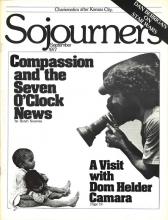To raise the question of the confessing community and where it can be found today is to raise the fundamental question of the church's very identity and visibility. Who do the people of God think they are? How do they live? Where can the confessing community be found whose confession bears concrete relationship to its daily life? Is the community's relationship both to God and to its historical situation clear in its mind and actions?
Such clarity of relationships is precisely what is most lacking now in the American churches. It's hard to find the church who knows what its confession must mean in America at the present moment. Confessing Christ, instead of being an act of words and life which prepares one for personal risk, sacrifice, even martyrdom, has become, in the American context, a positive asset--socially and even politically. In recent times we have seen that such a confession might even help one win the White House.
The growth of a certain kind of evangelical religion in the United States has greatly blurred and reduced the meaning of the gospel to terms which are culturally and politically acceptable. Born-again religion is "in." It is everywhere. It is a media phenomenon. The cultural majority of "confessors" includes former presidential aides and former revolutionaries, football and movie stars, politicians and Miss Americas. The marks of such faith are evident--success, fame, prosperity, influence, and above all, loyalty to the American way of life.
In this situation the American churches are in danger of losing any sense of their true identity. The New Testament vision of the kingdom of God is easily replaced by an American civil religion where the church's life becomes so wedded to the realities of the present American order that the sense of preserving the holy, of bearing true witness to the evangel, of living under the word of God, is lost.
Read the Full Article

